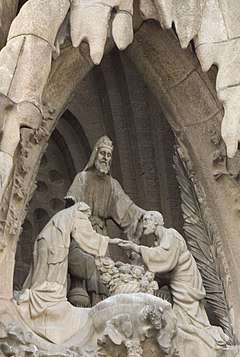Matthew 1:19
Matthew 1:19 is the nineteenth verse of the first chapter in the Gospel of Matthew in the New Testament. It is part of the description of the events surrounding the birth of Jesus. Joseph has found Mary to be pregnant and in this verse considers leaving her.
| Matthew 1:19 | |
|---|---|
← 1:18 1:20 → | |
 Legendary Rendering of the Marriage between Joseph and Mary, Nativity Façade from Plaça de Gaudí, Barcelona (October 2009) | |
| Book | Gospel of Matthew |
| Christian Bible part | New Testament |
Content
The original Koine Greek, according to Westcott and Hort, reads:
- ιωσηφ δε ο ανηρ αυτης δικαιος ων και μη θελων αυτην
- δειγματισαι εβουληθη λαθρα απολυσαι αυτην
In the King James Version of the Bible the text reads:
- Then Joseph her husband, being a just man, and not willing to
- make her a public example, was minded to put her away privily.
The New International Version translates the passage as:
- Because Joseph her husband was faithful to the law,
- and yet did not want to expose her to public disgrace,
- he had in mind to divorce her quietly.
For a collection of other versions see BibleHub Matthew 1:19.
Analysis
That this verse refers to Joseph as Mary's husband does not conflict or mean a change in circumstances from Matthew 1:18, where he is merely her betrothed. The betrothal of the period was a formal arrangement and the couple can reasonably be considered husband and wife while betrothed.
Exactly what this verse means by Joseph being a "just man" is much discussed. The Greek term is dikaios, and it has variously been translated as just, righteous, upright, and of good character. Brown outlines three basic interpretations.[1] Most of the ancient commentators of the Bible interpreted it as meaning that Joseph was law abiding, and as such decided to divorce Mary in keeping with Mosaic Law when he found her pregnant by another. However, his righteousness was tempered by mercy and he thus kept the affair private. A second view, first put forward by Clement of Alexandria, is held by most modern Christians. This view sees Joseph's righteousness, not in his rigid adherence to the laws, but rather in his mercy itself. By this view the decision to ensure Mary was not shamed was not an exception to Joseph's righteousness, but the proof of it. By this view mercy is more righteous than obedience. A third view is based on the idea that Joseph already knew that Mary's child was divinely conceived. This is in keeping with the Gospel of Luke in which Mary is quickly told how she became pregnant. By this interpretation Joseph's righteousness is his great piety that leads him to quickly accept Mary's story and his desire not to intrude with God's plan for his new wife.
Some scholars have tried to do away with the disquieting word divorce in this verse, and most older translations did so. Since Joseph has just been described as righteous having him consider a divorce could imply that divorce is righteous. Especially in the 19th century, a number of scholars tried to read alternate meanings into the term. One proposal was that it merely meant separate: that the couple would split but that legally they would remain married. However recent discoveries have found that legal avenues for divorce existed at the time in question. One of the clearest pieces of evidence is a divorce record from 111 AD, coincidentally between a couple named Mary and Joseph, that was found among the Dead Sea Scrolls. The Greek word here translated as divorce is aphiemi, and the only other time it appears is in 1 Corinthians 7:11 where Paul uses it to describe the legal separation of a man and wife. Almost all modern translators today feel that divorce is the best word. Today, versions that do not use the word divorce do so for doctrinaire reasons. This verse also provides one of the main scriptural justifications for divorce for churches that accept the practice. Since the marriage in question was never consummated, the divorce Joseph was contemplating does not violate the beliefs of churches, such as the Roman Catholic Church, who reject divorce.[2][3]
What the verse means by privately is also open to discussion. Rabbinic law from the period gives two methods of divorce for reason of adultery. One was to bring the matter to the village council, which would hold a hearing and, if the allegations were proved, grant a divorce. The second method was to have the evidence presented and approved by two witnesses who would then certify the divorce. By quietly most scholars believe the verse means that Joseph would take the second option. Gundry argues that the witnesses were necessary to prevent a woman denying that the divorce had taken place. Gundry believes that by quietly the verse means that even the witnesses would be forgone and the separation would be an entirely private affair.[4]
See also
References
- Brown, Raymond E. The Birth of the Messiah: A Commentary on the Infancy Narratives in Matthew and Luke. London: G. Chapman, 1977.
- Schweizer, Eduard. The Good News According to Matthew. Atlanta: John Knox Press, 1975
- Albright, W.F. and C.S. Mann. "Matthew." The Anchor Bible Series. New York: Doubleday & Company, 1971.
- Gundry, Robert H. Matthew a Commentary on his Literary and Theological Art. Grand Rapids: William B. Eerdmans Publishing Company, 1982.
| Preceded by Matthew 1:18 |
Gospel of Matthew Chapter 1 |
Succeeded by Matthew 1:20 |
.jpg)